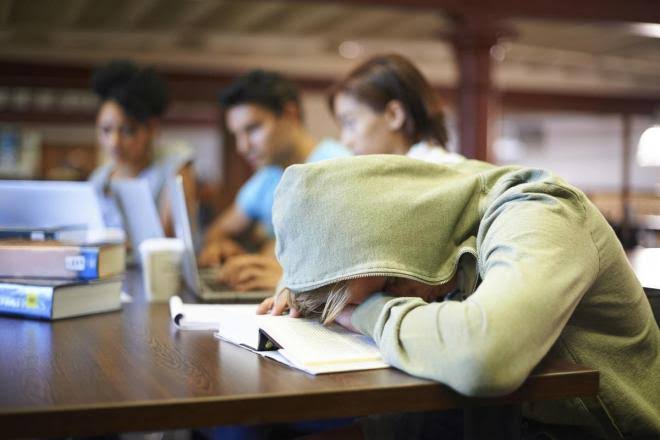CAMPUS REPORTS
Students Call for Improved Support University Services System as Fear, Anxiety Affect Mental Health

Mental health issues among University students in Nigeria have become a growing concern, with many students reporting stress, anxiety, and burnout due to academic and personal pressures.
In interviews with students from various Nigerian universities, it became evident that mental health challenges are widespread, affecting academic performance and overall well-being.
Orunduyi Precious Ayomide, a 300-level student from Adekunle Ajasin University, Akungba-Akoko, shared her struggles with financial pressures and academic frustrations. “Finances and academic frustration, actually.
Getting bad grades after working our asses the whole semester and having to attend to certain payments,” she said, highlighting the emotional toll these factors have on students.
She noted that while the Student Affairs Division offers counseling services, few students seem to use them. “They do, at the Student Affairs Division, but I’m not sure if I know anyone who has been there for counseling or services,” Ayomide added.
Akinyamoju Tumise, a 300-level English student from the same institution, emphasized that the stress and anxiety are faced by students due to physical demands and academic pressures.
“Stress like trekking, walking from one place to another, blood exhaustion, and anxiety, these all contribute to someone’s mental health. It’s the fear of your day-to-day activities, like maybe you won’t take presentations,” Tumise explained.
She however doubted university’s mental health support, saying, “I don’t know if my school actually gives any mental health support or anything. I can’t say, I don’t know.”
Emesonoghena Issah, a student from the University of Ilorin, added that students often experience burnout and anxiety, particularly due to long distances between lecture halls and tight class schedules.
Isaiah noted, “We are burned out because of the stresses of walking from one faculty to another. The distance between our lecture halls are strangely so far.”
He also shared his concerns about the lack of mental health support, saying, “I have never seen any or heard anybody talk about them,” but added that such services would be helpful for students.
Susan Olorunfemi, a Law student at Obafemi Awolowo University, Ile-Ife, Osun, highlighted the impact of academic pressure on students’ mental health. “What readily comes to mind is exam fear. There are high expectations for you, and you don’t want to disappoint, which adds pressure,” she said.
She also noted that stress from a bulky workload often leads to mental health challenges if not properly managed. “Mental stress is a thing. It’s very common among every human that has something going on for him/her,” she explained.
While some students expressed uncertainty about the availability of mental health services on their campuses, Olorunfemi emphasized the need for awareness. “Awareness needs to be made that mental health is a real thing and it’s not something to be ashamed of,” she stated.
Susan however suggested that seminars and better structures be put in place to provide support to students and reduce stigma.
“Structures should be put in place to punish anyone that makes any show of promoting mental abuse. Above all, awareness is very much important.”
The need for university administrations to take mental health more seriously has never been more urgent. Students from various institutions across Nigeria are calling for better support systems, including accessible counseling services and awareness campaigns to help reduce stigma. As Olorunfemi rightly put it, “students need a voice that will speak for them” and help reduce the pressures that contribute to mental health challenges in academia.
Experts Reacts
Hauwa Bello, a psychotherapist and chief executive officer of Mumtaz Mind and Wellness Studio in a report by University World News, urged universities to engage more professionals, such as counsellors, psychologists and social workers, in light of an acute shortage of psychiatrists in the country.
To curb suicides, Bello said, lecturers should be trained to identify signs of distress in students and provide timely interventions.
She said: “There is no excuse why a university should not have a proper mental health unit run by trained professionals. The unit should be able to assess students and make appropriate referrals in cases it cannot handle.
“We also need mental health support groups in all universities to be manned by professional psychotherapists and clinical psychologists to serve as a support system for students.”
“Universities should carry out mental health screening for students with their consent to be able to identify who is vulnerable among them; who has adverse childhood experiences, and begin interventions early. Universities can equally choose a mental health day when students can talk about mental health in a non-judgmental way to avoid stigma,” said Bello.
Dr Olugbemi Olukolade, in the same report lamented that student support centres in several Nigerian universities are inactive because they are mostly run by lecturers with core responsibilities of teaching and research.
“Psychotherapy is a long-term process. Some sessions can last as long as 36 weeks if the session is administered every week. And that is for one person in a university of 5,000 to 10,000 students.
“Universities need to employ psychologists or therapists who can take over those units. They must be totally different from academics.
“We also need to look at where the problems come from. Do we have bullies as lecturers? Are students doing all sorts of jobs to be able to pay their school fees and survive? Stress can predispose such students to depression, so universities should provide opportunities for them to work on campus and make money.
“Universities should have a sexual abuse desk where students can report harassment anonymously, seek help, and find resolution to the matter. A lot of universities don’t have [sexual abuse desks] and most times when students report sexual harassment, they don’t get justice. This can lead to depression,” he said
Discover more from Asiwaju Media
Subscribe to get the latest posts sent to your email.
-

 TECH7 days ago
TECH7 days agoFG Launches TVET Initiative To Empower Nigerian Youth With Industry-Relevant Skills
-

 NEWS5 days ago
NEWS5 days ago2025 C-SAGAS Arts and Sciences Competition Officially Flagged Off in Ebonyi State
-

 EDITORIAL3 days ago
EDITORIAL3 days agoHow Chinedu Ogah Perfected the Art of Political Wayo
-

 NEWS7 days ago
NEWS7 days agoTragedy Strikes as 20 Kano Contingent Members Die in Fatal Crash After National Sports Festival
-

 ENTERTAINMENT5 days ago
ENTERTAINMENT5 days agoAngela Okorie Appears To Shade Destiny Etiko After Wedding Drama
-

 CAMPUS REPORTS7 days ago
CAMPUS REPORTS7 days agoCall for Applications: One Young World Leading Scholarship 2025 ( Fully Sponsored Trip to Summit in Munich, Germany)
-

 ENTERTAINMENT7 days ago
ENTERTAINMENT7 days agoCardi B to Offset: “I Want You to Die Slow” Amid Spousal Support Drama
-

 ENTERTAINMENT5 days ago
ENTERTAINMENT5 days agoCarter Efe Slams Portable Over ₦10 Million TikTok Appearance Fee Demand
-

 ECONOMY5 days ago
ECONOMY5 days agoCall for Applications: FG TVET Training Portal Opens for 5 Million Nigerian Youths | (N30,000 Artisan Pay, Free Skills, Starter Kits, and Soft Loans)
-

 CAMPUS REPORTS7 days ago
CAMPUS REPORTS7 days agoNigeria Launches Talent City to Transform Campuses into Tech Hubs and Combat Youth Unemployment
-

 JOBS/SCHOLARSHIPS3 days ago
JOBS/SCHOLARSHIPS3 days agoCall For Applications: Llama Impact Accelerator Program 2025 for African startups (Equity-free funding of $25,000)
-

 ENTERTAINMENT4 days ago
ENTERTAINMENT4 days agoLinc Edochie Reportedly Ties the Knot in Private Ceremony with U.S.-Based Partner






















